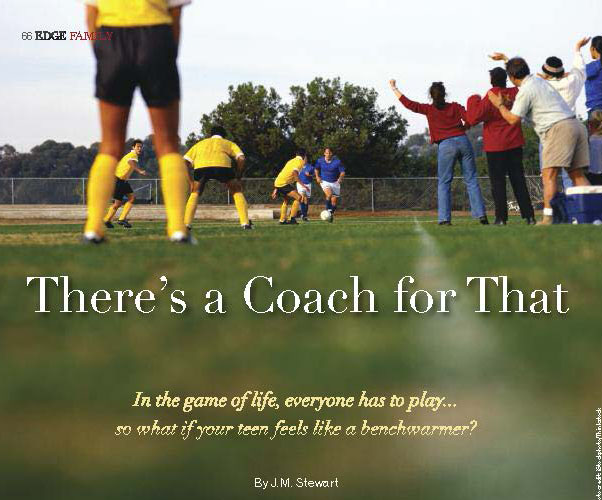In the game of life, everyone has to play…so what if your teen feels like a benchwarmer?
By J.M. Stewart
The term Life Coach means different things to different people. You can hire one to help you with anything from cleaning out your closet to overcoming an addiction. For some people, a life coach is like an iPad—they didn’t know they needed one until they had one.
For teenagers struggling to find their way, however, a good life coach can mean the world.
Life coaches help navigate difficult changes and transitions. For young people, that can include moving from an old neighborhood to a new one, from a divorce to a remarriage, from high school to college—or out of a feeling of isolation. A life coach functions as a personal cheering squad and support group rolled into one, offering guidance toward a more balanced and happy life.
A generation ago, the idea of hiring a life coach sounded self-indulgent and a waste of money—something a bored, aimless yuppie would do. Life coaches made convenient fodder for sitcom writers. Today, there’s nothing to laugh about. Not only have life coaches gained in popularity and acceptance, there are numerous certification and training courses available (think amped-up Psych 101 courses) lasting from a few weeks to six months.
That being said, some of the most experienced, competent and successful life coaches are not certified. Their view is that most courses don’t offer the tools that a background in psychology—combined with years of working as a coach—has taught them. But, for the newbies, having a certification doesn’t hurt.
Why then, one might reasonably ask, wouldn’t you just go to a psychologist or other licensed professional instead of hiring a life coach?
“Sometimes,” explains Dove Rose, a highly regarded life coach based in California, “a regular psychologist, psychiatrist is problem-solving with medication or analyzing the past…you’re just in the hamster wheel, regurgitating the same story over and over, instead of trying to live a different story now.”
Indeed, the client–coach relationship is more casual than the psychotherapist–patient relationship. Psychologists rely mostly on scheduled office visits, whereas a life coach is accessible day or night by phone, through emails and texts, or on Skype. A life coach will also come to your home; psychologists don’t. Naturally, a good life coach is always aware that there is a very fine line between knowing when a client just needs someone to talk to, and when there are danger signs of a more serious rooted problem. That is when a life coach recommends the client seek help from a licensed professional.
What types of issues prompt a call to a life coach? Just about any complex lifestyle issue is fair game. In the case of teenagers, the trigger might be remoteness and slipping grades. As a parent, everything you read and hear screams Oh, no—my kid’s on drugs! A life coach who comes in and builds trust with that teen is likely to discover an alternative scenario. For instance, the parents might be raging alcoholics and the teenager doesn’t have the tools to cope with it. Sometimes, the kid just needs a friend who will listen.
 Rick Singer began his career as a coach and director of college-level athletics. For more than 25 years he has made a living as a life coach. He’s done life coaching in the corporate environment, as well on the student level. He has helped countless high-school student-athletes follow their dreams and play college sports, and worked with sports celebrities in planning their goals once their playing careers were over. Singer has been most successful working with teens and young adults in finding a college that is an appropriate fit. He cannot emphasize enough the importance of that “fit”—which is why he named his company The Key.
Rick Singer began his career as a coach and director of college-level athletics. For more than 25 years he has made a living as a life coach. He’s done life coaching in the corporate environment, as well on the student level. He has helped countless high-school student-athletes follow their dreams and play college sports, and worked with sports celebrities in planning their goals once their playing careers were over. Singer has been most successful working with teens and young adults in finding a college that is an appropriate fit. He cannot emphasize enough the importance of that “fit”—which is why he named his company The Key.
Teenagers, Singer freely admits, can be notoriously exasperating. It will come as no surprise to parents that he has worked with a number of kids who’ve simply had no interest in growing or taking chances where college is concerned. A lot of the time, Singer points out, it’s the result of overzealous parents who are relentless in the desire for their child to get into a big-name four-year college. In these cases, he sometimes finds the parents are unyieldingly negative to the child and negative to the life coach. In extreme circumstances, if the parents are totally out of control, Rick will actually “fire” them; in any given year he will do so with two to four families. It’s unfortunate because, in his experience, the kid will eventually come around.
Many parents of middle-school children hire life coaches. Their goal is to help their young teen deal with issues ranging from time management and personal grooming to weight loss and inferiority complexes. If your 8th grader hands in her homework on time but it’s a crumpled mess, and the teacher deducts points, a life coach might recommend using a folder. You’ve been telling your daughter that for a month—but does she listen? No, of course not. You are a meddling, know-nothing parent. When that same nugget of wisdom comes from a trusted, outside voice, that is the voice your 8th grader will choose to hear.
Before you jump into hiring a life coach—for your child or yourself—it’s important to understand that this can be an ongoing relationship. It can start out as once-a-week meetings or phone calls, evolve into every-day communication during panic situations, and then wane to once every two weeks, once a month, or just once in awhile. The cost of all of this support varies. Some coaches charge $60 an hour, some $200 per hour, some$5,000 for a whole year of coaching. So, it’s important to understand the coach’s billing system. Make sure to ask if they charge extra for phone calls, texts and emails.
Life coaches aren’t for everybody, but they do offer people a sense of calm and community, knowing that there is always someone they can talk to. People today often feel isolated as a result of problems at work, at school or at home. And although we are more connected than ever thanks to our myriad devices and social media outlets, it doesn’t mean we feel less isolated, sitting in a room by ourselves. For all of these technological advances, we seem to be losing the human exchanges that keep us whole.
“It takes a village,” Dove Rose likes to remind clients, “to stay sane in this world.”
And yes, you can say that a life coach is really just a paid friend. But you get what you pay for: everything that a really good friend should be.
Life Coaches & College:
5 Minutes with Rick Singer
Q: When is the best time for a life coach to enter into a teenager’s life?
A: A third of our families are in 9th grade, a third are in 10th grade, and the last third are the “panic” families.
Q: What is the difference between what you do as a life coach and a college advisor?
A: A lot of people who do what I do are just college advisors. They don’t engage in the kids’ lives, helping them figure out what they want to be and how to do it in terms of schooling. Life coaches are the people who engage in our clients’ lives and do different things to help them grow, in addition to getting into college. Because I’m in the home, I see everything else that goes on in the house. Whereas most advisors just focus in on the technical aspects of helping a kid get into college—like helping with the application—I do both. I want to help them get into college and I want to help them grow as people. The key is coaching them in everything about their life. There aren’t a lot of people who do it like we do it.
Q: What are some issues that you help with outside of the college process?
A: It can be a lack of motivation, especially with boys. There are kids who have learning “differences” and the parents feel that nobody cares about them; meanwhile they’re smart kids! The high-school advisor has no clue or doesn’t want to take the time to help. I also help to find the right school for the student, now that there are so many schools that the kids are looking at and comparing.
Q: How do parents of girls differ from parents of boys in terms of their goals for college?
A: The typical parents will send their daughter to a private school more so than they would a boy, because the parents of a girl want their kid at a “safe” school, a small, safe college. Boys? The mindset is just throw ’em into any public college—they’ll survive. That is not always the case, however. Sometimes a junior college, or even a trade school, is a more appropriate choice.






